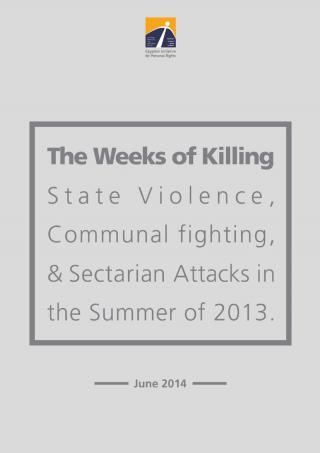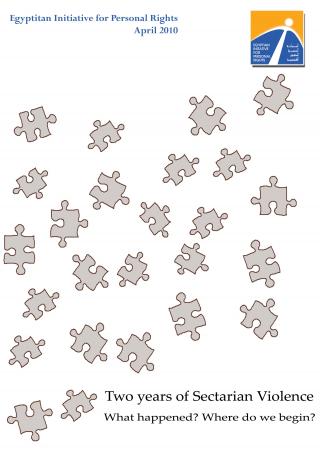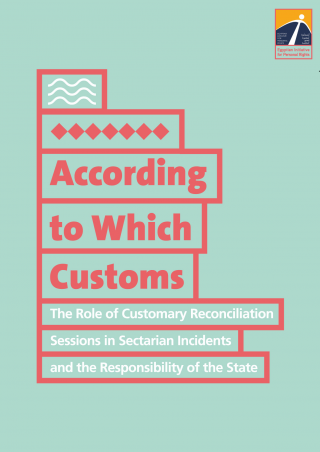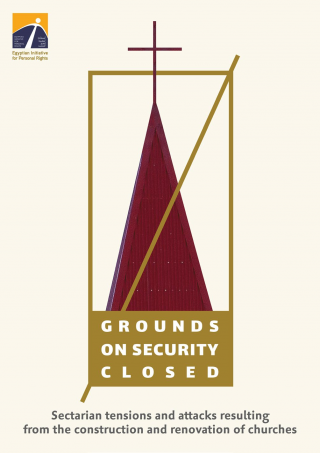On 11 April, the Egyptian Initiative for Personal Rights (EIPR) issued an analytical study titled “Two Years of Sectarian Violence: What Happened?
Search
The Egyptian Initiative for Personal Rights today issued a report on the most significant incidents of political violence that swept Egypt in the weeks bef
The undersigned organizations express their grave concern regarding the increasing sectarian violence which has targeted Christians and their churches since the uprising of June 30. These organizations strongly condemn the rhetoric employed by le
The Egyptian Initiative for Personal Rights today renewed its warnings about the gravity of the wave of sectarian violence that has swept Egypt over the last few weeks and took a more severe turn with the dispersal of the sit-ins of supporters of
The Egyptian Initiative for Personal Rights (EIPR) today released the preliminary findings of its inquiry into the sectarian violence that took place in the village of Al-Tayeba, located in the Samalut district of Al-Minya Governorate, on Friday,
“The government has failed to deal with the issue of Christian-Muslim relations and sectarian attacks due to the dominance of a purely security mentality,” said Ishak Ibrahim
The undersigned organizations condemn the unprecedented extra-judicial killings and acts of violence committed by military police and central security forces, on the 9th of October in the Maspero area and central Cairo.
The Egyptian Initiative for Personal Rights today issued a report on the most significant incidents of political violence that swept Egypt in the weeks before and after the government of former President Mohamed Morsi was deposed in July 2013. The state bears primary responsibility for what may be the worst acts of violence in Egypt’s modern history, with thousands killed and injured.
The Egyptian Initiative for Personal Rights (EIPR) is holding a press conference to release its new study Sectarian Violence in Two Years: What Have We Learned?. The study p
The undersigned human rights organizations express their profound unease at the rising wave of sectarian violence, which threatens to drag Egypt into Muslim-Christian civil strife, after it has become clear that those in charge of administering th
“Whose Customs? The Role of Customary Reconciliation in Sectarian Disputes and State Responsibility”
the Egyptian Initiative for Personal Rights released a study on the use of customary reconciliation to resolve sectarian disputes and the state’s responsibility for the violation of citizenship rights and its support for discriminatory procedures against Coptic citizens.
Introduction- 1. Egypt is no different than other societies comprised of individuals and groups espousing different religious beliefs and affiliated with various religious communities. Many societies are able to live with these differences and, indeed, build on this diversity to enrich public life. Other societies, whether by design or default, are unable to manage diversity, some to the extent that they are unable to uphold coexistence.
The Egyptian Initiative for Personal Rights (EIPR) launched a new advocacy campaign to combat sectarianism in Egypt under the slogan, "Reject Sectarianism".
The undersigned rights organizations condemn the use of excessive force yesterday by the security authorities when dispersing the sit-in by the Muslim Brotherhood (MB) and its supporters at Rabia al-Adawiya Square in the Cairo governorate and Nahd
“Whose Customs? The Role of Customary Reconciliation in Sectarian Disputes and State Responsibility”
The study, titled “Whose Customs? The Role of Customary Reconciliation in Sectarian Disputes and State Responsibility,” focuses on the period from January 2011 to the end of 2014.
The Egyptian Initiative for Personal Rights (EIPR) cautioned today about the possible outbreak of sectarian violence in the village of Deshasha, located in the district of Sumusta in the Governorate of Beni Soueif, after police used violence on Su
The study includes an analytical section and two annexes. The analysis reviews statutes regulating church construction, significant court rulings of relevance, and their impact on the legal status of existing churches and various official licenses. The study then looks at the types and frequency of sectarian attacks linked with the exercise of the right of worship, offering a quantitative analysis of the 74 sectarian attacks seen in Egypt from January 25, 2011 to August 2016. It describes the flashpoints of tension, the profile of attacks and their relationship to political parties or governing forces, and whether patterns changed in tandem with changes in regime.
The study includes an analytical section and two annexes. The analysis reviews statutes regulating church construction, significant court rulings of relevance, and their impact on the legal status of existing churches and various official licenses. The study then looks at the types and frequency of sectarian attacks linked with the exercise of the right of worship, offering a quantitative analysis of the 74 sectarian attacks seen in Egypt from January 25, 2011 to August 2016.
The undersigned organizations are severely alarmed by the massacre that took place on the Nasr Road in Cairo at dawn on Saturday, July 27, after police forces attacked demonstrators supporting the Muslim Brotherhood (MB).
One year after the criminal attacks on Egyptian Baha’is in the village of Shuraniya in Sohag, the Egyptian Initiative for Personal Rights (EIPR) expressed its disappointment at the Public Prosecutor’s failure to bring the assailants and those who
Twelve human rights organizations under the umbrella of the Forum for Independent Egyptian Human Rights Organizations strongly condemn the bombings which took place on New Year's day targeting worshippers leaving Saints Church in Alexandria after
The Egyptian Initiative for Personal Rights (EIPR) welcomes the publication of some of the findings and recommendations of the Fact-Finding Commission for the events of June 30, and calls on the government to create a follow-up mechanism to implem
The Egyptian Initiative for Personal Rights said that three years after its adoption, the church construction law has failed to end violations of Christians’ right to worship and address related sectarian tensions. It criticized the security apparatus for shutting down church buildings and thereby prohibiting many Copts in Egyptian villages from engaging in collective worship.
The Egyptian Initiative for Personal Rights (EIPR) is concerned by recently issued Law 51/2014 regulating sermons and religious lessons in mosques, seeing in it a continuation of policies designed to curb freedom of religion and enforce a legal mo







